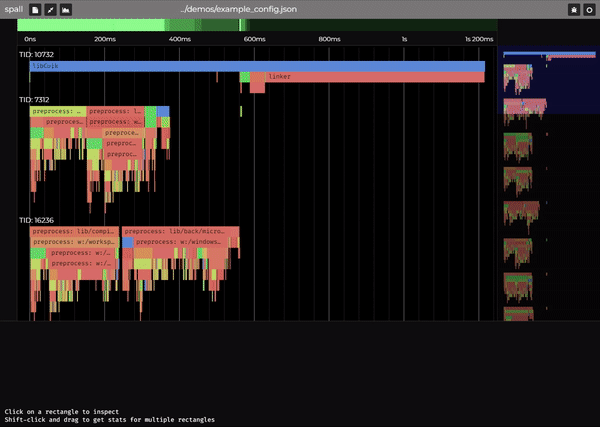Spall-web, augmented with an ability to page in pieces of a trace as tiles and a tool to generate those tiles (tools/tile). >4GB traces can now be viewed in the browser and shared as static websites.
A 4.2GB trace of GraphViz dot layout is live at https://ilidemi.com/projects/tiled-spall/
spall is a profiler library and a web-frontend for exploring your code and digging into potential performance problems.
^ this is a 180 MB (526 MB JSON equivalent), 5 minute trace from Happenlance, courtesy of @pmttavara!
- Zippy! spall can load 500 MB of .spall data into your browser in a second or two, and you can scroll and pan it at a glorious 165+ FPS
- Easy to Use! Single-header C library for instrumenting your code
- Numbers Galore! spall can collect a handful of very useful stats about your program without even breaking a sweat
- Light/Dark Modes! You can blow your eyes out in light mode, relish the sweet neon colors in dark mode, or auto-switch with your system
- Velociraptors Included! Uhh, wait, sorry, we're all out. No velociraptors here. You can pretend though.
Try it over at Gravity Moth
spall includes a small single-header C library, spall.h.
spall currently supports 2 different file formats:
- .json, in Google's trace format used by
perfetto,chrome://tracing, andspeedscope, described below - .spall, our custom binary format
You can either instrument your code with our header, or use your existing chrome://tracing compatible JSON dumping code.
If you're starting from scratch, you probably want to use the spall header to generate events. The binary format has much lower profiling overhead (so your traces should be more accurate), and ingests around 10x faster than the JSON format.
If you want to use JSON, spall expects events following Google's JSON trace format They look like this:
[
{"cat":"function", "name":"main", "ph": "X", "pid": 0, "tid": 0, "ts": 0, "dur": 1},
{"cat":"function", "name":"myfunction", "ph": "B", "pid": 0, "tid": 0, "ts": 0},
{"cat":"function", "ph": "E", "pid": 0, "tid": 0, "ts": 0}
]
(spall doesn't care about trailing commas and close brackets are not required, to ease file creation / event streaming)
cat - Category of event. Currently unused
name - the name of the event, a string
ph - The type of event
| Type | Symbol |
|---|---|
| Begin | "B" |
| End | "E" |
| Complete | "X" |
tid - thread id, u32
pid - process id, u32
All tids and pids must be between 0 and u32_MAX, as whole values
ts - timestamp, a double, in microseconds
dur - timestamp, a double, in microseconds
(A timestamp of 1 starts at 1 μs)
Spall currently supports only Begin, End, and Complete events
{"cat":"function", "name":"foo", "ph": "X", "pid": 0, "tid": 0, "ts": 0, "dur": 1},
Complete events require a duration field, because they track a function's start/end all in one
{"cat":"function", "name":"myfunction", "ph": "B", "pid": 0, "tid": 0, "ts": 0},
{"cat":"function", "ph": "E", "pid": 0, "tid": 0, "ts": 0},
End events automatically close the most recent begin event with the same pid and tid, so they don't need names
Regardless of ingest format, all begin and end events within a process/thread (pid/tid) are expected to be in earliest timestamp first, sorted order ex:
[
{"cat":"function", "name":"main", "ph": "B", "pid": 0, "tid": 0, "ts": 0},
{"cat":"function", "name":"foo", "ph": "B", "pid": 0, "tid": 0, "ts": 1},
{"cat":"function", "ph": "E", "pid": 0, "tid": 0, "ts": 2},
{"cat":"function", "ph": "E", "pid": 0, "tid": 0, "ts": 3}
]
